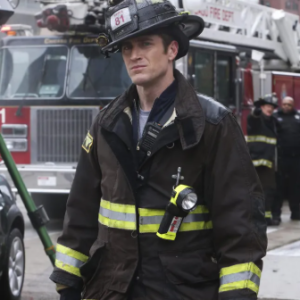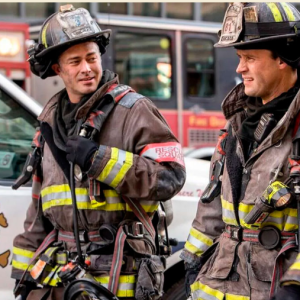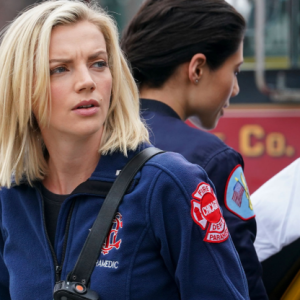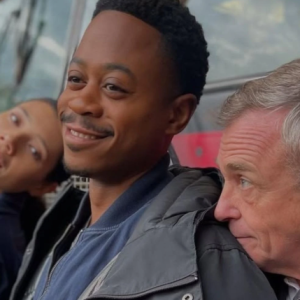For a show that thrives on high-stakes drama and emotional gut punches, Chicago Fire has once again proven that it knows how to keep its audience hooked in ways no other network drama can match. As the smoke cleared from the Season 13 finale, fans weren’t left breathless from a daring rescue or explosive blaze, but from a gut-wrenching announcement that seemed to signal the end of firefighter Sam Carver’s journey. Reports spread like wildfire: Jake Lockett, the actor who brought Carver to life, was leaving the NBC hit, and the timing felt cruelly poetic. After seasons of tension and missed chances, Carver finally sealed his romance with Violet Mikami in a passionate kiss, only to be ripped away by a transfer to Denver. The fandom collectively mourned, believing they had been given love only to have it snatched away. Media outlets confirmed his departure, social media spiraled into panic, and the sense of finality was overwhelming. Fans of Chicago Fire know heartbreak is part of the ride, but this time, the loss felt uniquely personal—a beloved character seemingly cut down at the height of his emotional arc. It was a classic Chicago Fire move, leaving viewers raw and devastated, bracing for a Season 14 without Carver. 
But as it turns out, everything we thought we knew was part of a brilliant illusion. In a rare moment of candor, showrunner Andrea Newman delivered the revelation that flipped the narrative on its head. Carver’s exit, she revealed, was not permanent. Jake Lockett may no longer be a series regular, but Sam Carver is not gone—he is shifting into a recurring role, and the possibilities this opens are staggering. “We may not have Carver full-time next season, but we may have him for a bunch of it too,” Newman teased, words that reignited hope in the fandom like a fresh gust of oxygen to glowing embers. Even more tantalizing, Newman emphasized that there is “a lot left to figure out” between Carver and Violet. Suddenly, the heartbreaking goodbye kiss in the Season 13 finale transformed from a tragic farewell into a thrilling cliffhanger. Carver’s story isn’t ending; it’s evolving. By staging an apparent departure and then reversing course, Chicago Fire pulled off the kind of narrative sleight of hand that leaves viewers not just relieved, but electrified.
This twist works on multiple levels, proving once again why Chicago Fire remains a masterclass in serialized storytelling. By dangling the possibility of Carver’s permanent exit, the writers amplified the emotional weight of the finale, making that kiss with Violet not just romantic but devastating. Fans believed it was the last time they’d see the couple together, which magnified the intensity and burned the moment into their memories. Now, with the revelation that Carver is sticking around part-time, the series has effectively doubled the emotional impact: first the heartbreak of loss, now the euphoria of reprieve. The misdirection also speaks to the show’s willingness to embrace uncertainty, a theme deeply embedded in both the firefighting profession and the lives of its characters. Careers in real fire departments are shaped by transfers, budget cuts, and sudden shifts in assignment, and Carver’s semi-exit mirrors that reality while giving the writers room to maneuver creatively. Instead of losing him completely, fans will now experience the unpredictable thrill of his on-and-off presence, allowing the character to remain a source of tension, romance, and surprise.
The implications for Season 14 are enormous. Carver and Violet’s relationship, which fans feared would be cut short, now has the space to breathe and evolve. Instead of being reduced to a long-distance “what if,” their romance can simmer on screen, full of longing glances, half-finished conversations, and the electric unpredictability of when Carver will next appear. Firehouse 51 itself will also feel the ripple effects. How does a team adapt when one of their own is present one week and gone the next? Carver’s fluctuating role could create new layers of camaraderie, friction, and even jealousy, as the firehouse adjusts to his intermittent status. Beyond relationships, the storyline gives Chicago Fire the chance to explore career uncertainty with unprecedented authenticity, reflecting the instability that real firefighters face. And for Carver himself, the narrative potential remains rich: his struggles with sobriety, his journey of redemption, and his growing role as both a firefighter and a man in love still hang in the balance. Whether he ultimately returns full-time or fades into a bittersweet compromise with Violet, the fact that nothing is set in stone makes the arc one of the most compelling to watch.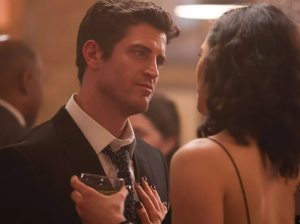
In the end, what looked like a cruel goodbye has revealed itself as one of Chicago Fire’s boldest gambits, and it underscores why this show has captivated audiences for more than a decade. In a television landscape where spoilers spread faster than flames and genuine surprise feels almost impossible, pulling off a misdirection this convincing is nothing short of extraordinary. Fans may have cried, raged, and mourned when they thought Carver was gone, but those emotions are not wasted—they are the fuel that now powers their anticipation for what comes next. The kiss was not a goodbye but a beginning, and the uncertainty of Carver’s future has become the hook that will carry viewers into Season 14. Was the heartbreak worth it? Absolutely. Because in being fooled, in being left devastated only to be lifted back up, fans are reminded why they fell in love with Chicago Fire in the first place: not just for the flames, but for the unpredictability, the gut punches, and the moments that feel like they matter long after the credits roll. Carver’s so-called exit was a lie—but it was the kind of beautiful, agonizing lie that only makes the truth burn brighter.


